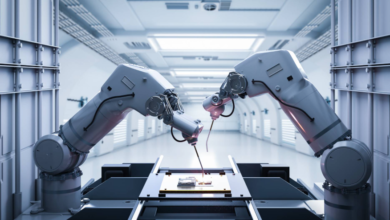Automation and AI: How Machine Learning Is Transforming Business Operations

Introduction
The business world is evolving at a rapid pace, and a significant driver of this transformation is the rise of automation and artificial intelligence (AI). Machine learning, a subset of AI, is playing a pivotal role in reshaping how businesses operate. Whether it’s improving efficiency, driving innovation, or enabling smarter decision-making, automation and AI technologies are revolutionizing industries. In this article, we will explore how these technologies are transforming business operations, from supply chain management to customer experience and decision-making.
Understanding Automation and AI
Defining Automation, AI, and Machine Learning
Before diving into the impact of automation and AI, it’s essential to understand what these technologies are.
- Automation refers to the use of technology to perform tasks without human intervention. It can involve anything from manufacturing robots to software that automates data entry.
- Artificial Intelligence (AI) is the simulation of human intelligence in machines. It encompasses technologies that allow computers to think, learn, and make decisions without human involvement.
- Machine Learning (ML) is a branch of AI focused on algorithms that enable computers to learn from data and improve over time. Machine learning is the engine driving much of the AI revolution, enabling systems to identify patterns and make predictions based on historical data.
By integrating these technologies, businesses can automate repetitive tasks, make better decisions, and enhance the overall operational efficiency.
See also: 5 Key Benefits of Automation for Small Businesses: Efficiency, Cost-Reduction, and Beyond
The Role of Machine Learning in Business
Key Concepts of Machine Learning
Machine learning has become a core component of modern business operations. By leveraging vast amounts of data, businesses can derive insights that were once unimaginable. The core concepts of machine learning that are transforming business include:
- Supervised Learning: A machine learning model is trained on labeled data to make predictions based on input data. This is commonly used in customer segmentation, forecasting, and product recommendations.
- Unsupervised Learning: In this approach, the system analyzes data without predefined labels, uncovering hidden patterns. It is used for clustering, anomaly detection, and market basket analysis.
- Reinforcement Learning: This type of learning focuses on decision-making in dynamic environments. It’s widely used in robotics and gaming but is increasingly being applied in areas like inventory management.
Machine learning enables businesses to adapt to changing conditions and continuously improve their processes based on real-time data, making it indispensable for business innovation.
How Automation Enhances Business Operations
Efficiency, Cost-saving, and Risk Reduction
Automation isn’t just about reducing the need for human labor; it’s about enhancing operational efficiency. In business, this leads to:
- Increased Productivity: Repetitive tasks, such as data entry, inventory management, or customer service inquiries, can be automated, freeing employees to focus on more strategic activities.
- Cost Reduction: By reducing the reliance on human labor, businesses save on salaries, training, and operational errors. Automation can also help optimize resource usage, further cutting costs.
- Risk Management: Automation can improve accuracy in tasks such as compliance reporting and financial management, reducing human error and the risk of costly mistakes.
By implementing automation, businesses can streamline processes, enhance productivity, and create more cost-effective operations.
Applications of Machine Learning in Different Industries
Healthcare, Retail, Manufacturing, and Finance
Machine learning’s influence extends across multiple industries, helping businesses make smarter, faster decisions:
- Healthcare: Machine learning algorithms assist in diagnosing diseases, predicting patient outcomes, and personalizing treatment plans. They can also optimize the management of hospital resources, ensuring timely delivery of care.
- Retail: In the retail industry, machine learning helps businesses understand consumer behavior, predict trends, and provide personalized recommendations to customers. AI-driven inventory management ensures that retailers never run out of stock or overstock.
- Manufacturing: From predictive maintenance to supply chain optimization, machine learning is revolutionizing the manufacturing sector. It helps predict machine failures, optimize production schedules, and manage inventory more efficiently.
- Finance: Machine learning models detect fraud, predict market trends, and automate customer service operations in the finance industry. They help companies mitigate risks and improve financial decision-making.
AI-Powered Decision Making
Data-driven Decisions, Insights, and Accuracy
One of the most significant impacts of AI and machine learning in business operations is on decision-making. AI-powered tools analyze massive volumes of data to provide valuable insights, helping businesses make informed decisions. These systems can identify trends and patterns that humans may overlook, leading to:
- Smarter Investments: Businesses can analyze market conditions, customer preferences, and historical data to make better financial decisions.
- Improved Forecasting: AI can predict sales, customer demand, and inventory needs with remarkable accuracy, allowing businesses to prepare and plan effectively.
- Operational Efficiency: Machine learning can identify bottlenecks in workflows, suggest process improvements, and help managers allocate resources more effectively.
How Machine Learning Optimizes Customer Experience
Personalization, Predictive Analysis, and Engagement
Machine learning is helping businesses deliver a personalized experience to customers. By analyzing customer behavior, preferences, and purchase history, businesses can tailor their marketing, offers, and communication strategies. Machine learning also enables:
- Predictive Analysis: Anticipating customer needs before they arise, leading to improved customer satisfaction and loyalty.
- Chatbots and Virtual Assistants: AI-powered chatbots provide instant responses to customer inquiries, enhancing customer service while reducing the burden on human agents.
- Customer Segmentation: Machine learning models help businesses categorize customers based on their behavior, enabling more targeted and effective marketing campaigns.
By utilizing machine learning, businesses can create a more engaging, personalized, and responsive customer experience.
AI in Supply Chain and Logistics
Automation in Supply Chain Management and Tracking
Machine learning plays a significant role in automating supply chain operations, helping businesses reduce costs and improve delivery times. Key applications include:
- Predictive Logistics: AI can predict demand, allowing businesses to adjust inventory levels accordingly and avoid overstocking or stockouts.
- Route Optimization: Machine learning models help optimize delivery routes, ensuring faster and more cost-efficient transportation.
- Real-time Tracking: AI-powered systems provide real-time tracking of goods, improving transparency and ensuring that businesses can quickly respond to issues like delays or shipping errors.
Reducing Human Error with AI
Minimizing Mistakes and Improving Quality Control
One of the significant advantages of AI is its ability to reduce human error. In sectors like manufacturing, finance, and customer service, automation helps improve the accuracy and reliability of tasks. Machine learning systems ensure that:
- Product Quality: AI algorithms monitor production processes in real time, detecting defects and ensuring that products meet quality standards.
- Accuracy in Data Entry: AI-powered systems eliminate common data entry mistakes, ensuring that critical information is accurate and consistent.
AI-Powered Business Analytics
Analyzing Big Data for Better Outcomes
Business analytics is a critical aspect of any company’s strategy. Machine learning allows businesses to process large datasets more effectively, uncovering insights that were previously hidden. With AI, businesses can:
- Analyze Large Data Sets: AI-powered tools can process and analyze vast amounts of data, turning it into actionable insights that drive decision-making.
- Predict Future Trends: By recognizing patterns and trends, machine learning helps businesses forecast future behaviors and market changes.
Real-time Monitoring and Predictive Maintenance
Monitoring Systems and Predictive Capabilities
AI systems enable real-time monitoring of critical business systems, allowing businesses to anticipate issues before they escalate. For example, in manufacturing, AI can predict when machinery will need maintenance, preventing costly downtime and improving operational efficiency.
The Ethical Implications of AI in Business
Ethics, Transparency, and Accountability
As AI becomes increasingly integrated into business operations, ethical concerns surrounding its use are growing. Businesses must address issues related to transparency, accountability, and fairness when deploying AI systems. This includes ensuring that AI models are unbiased and do not discriminate against certain groups.
Challenges in Implementing AI and Automation
Barriers and Hurdles to Adoption
While AI and automation offer incredible benefits, many businesses face challenges when implementing these technologies. These challenges include:
- High Initial Costs: The upfront investment required to implement AI solutions can be significant, especially for small and medium-sized enterprises.
- Lack of Skilled Talent: AI and machine learning require specialized expertise, and there’s a shortage of skilled professionals in the market.
- Integration with Existing Systems: Businesses must ensure that AI technologies integrate seamlessly with their existing infrastructure.
Future Trends in AI and Automation
What’s Next for AI, Machine Learning, and Business
The future of AI and automation looks promising, with new advancements and innovations constantly emerging. Some future trends include:
- More Personalized Experiences: AI will continue to enhance personalization, offering customers tailored products, services, and experiences.
- Improved Predictive Capabilities: AI models will become even better at predicting trends, allowing businesses to stay ahead of the curve.
- Increased Automation: More industries will adopt automation, leading to even greater operational efficiency.
Conclusion
Machine learning and AI are no longer futuristic concepts but essential tools that are actively transforming business operations. From enhancing decision-making to optimizing customer experience and streamlining supply chains, the potential of AI is vast. As businesses continue to embrace automation, they can expect increased efficiency, reduced costs, and a competitive edge in their industries.
FAQs
- What is the difference between AI and machine learning?
AI refers to the broader concept of machines being able to perform tasks that require human intelligence, while machine learning is a subset of AI that enables machines to learn from data. - How can machine learning improve customer experience?
Machine learning allows businesses to analyze customer behavior and preferences, enabling personalized experiences, predictive analysis, and improved customer service. - Is AI expensive to implement in business?
The initial cost of implementing AI can be high, but it can lead to significant cost savings over time by improving efficiency and reducing human errors. - What are the ethical concerns of using AI in business?
Ethical concerns include biases in AI algorithms, transparency in decision-making, and ensuring that AI systems do not discriminate or cause harm to individuals or groups. - Can small businesses benefit from AI and automation?
Yes, small businesses can benefit from AI by using automation for tasks like customer service, inventory management, and data analysis, which helps them compete with larger companies. - What industries are being most impacted by AI and machine learning?
Industries like healthcare, retail, finance, and manufacturing are seeing significant impacts from AI and machine learning, transforming operations and customer interactions.




